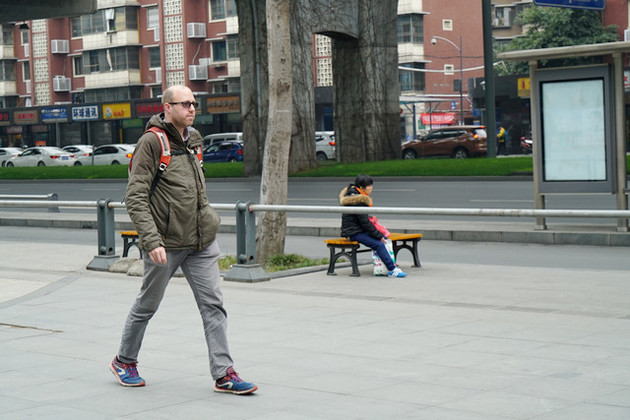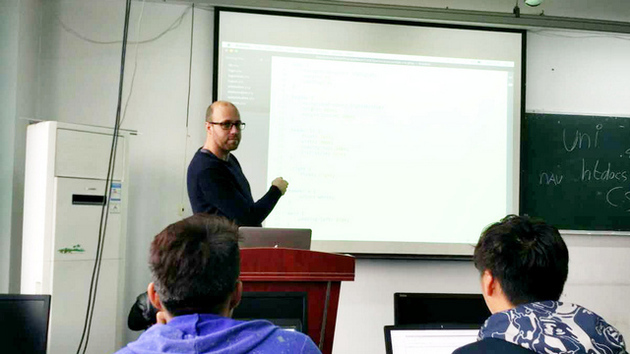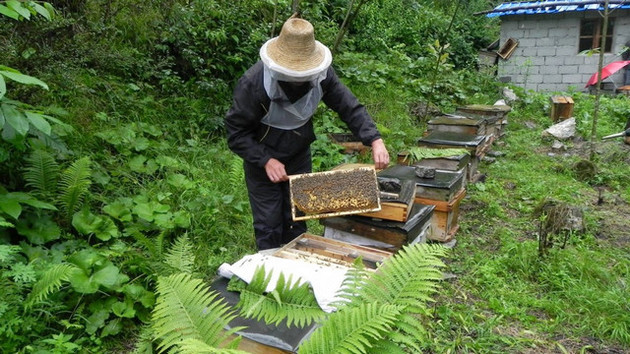
[Jons Slemmer/Photo by Li Jia]
When Dutch businessman Jons Slemmer came to Chengdu, the capital of southwest China's Sichuan province, in 2007 for the first time, he immediately fell in love with the famous cultural city that boasts a recorded history of more than 2,300 years.
Since then, he managed to retrace this intercontinental trip of 7,934 km from Amsterdam to the city once a year until 2014, when Jons made his final decision and moved to Chengdu, together with his internet-based business in Amsterdam.
He opened a consulting company which specializes in website designing, marketing, and social media in 2015, and named it as "Red Star".
"I want it sounds something like China-related", he said.
Jons, who will turn to his 34 next month, introduced that his business offers solutions for international customers to enter into the Chinese Market.
"Most of our old clients are from Holland, and we have one person who does the sales. For many clients, they contact us, because we do the hosting servers in China, we have a website and they just find us, not so many (Chinese) companies can do that for international companies, also the rules of Chinese government are also difficult for them to catch on by themselves, so they find us", Jons told NBD.
The company, whose clients include Heineken and other famous Dutch companies, has an international team. "I have some friends here in Chengdu that help me, also I have friends in Romania, one in Sweden, one in Holland, one in Ukraine. I believe the world is very digital, so it doesn't matter where people live in my business", he added, "I'm a digital nomad".
A LECTURER, A HONEY TRADER, A TOUR GUIDE
Graduated from the Amsterdam University of Applied Sciences (AUAS), Jons Slemmer is also a part-time computer science lecturer at Chengdu University of Technology (CDUT). The tech entrepreneur for 10 years gives lectures three times a week.

[Jons Slemmer gives lecture at CDUT/Photo provided by interviewee]
With this experience, he got to know one business partner at CDUT and joined an internet startup in Chengdu run by young entrepreneurs.
After moved to China, Jons made fully use of his time and has been to several Chinese cities including Beijing, Shanghai, and Xi'an. He also a motorbike fan. "Last year I rode my motorbike starting from Guilin, through Guiyang, Kunming, Panzhihua and arrived in Chengdu in two weeks, and I have been to many small places", Jons recalled.

[Fengtongzhai Honey Cooperative/Photo from the internet]
Back in 2013, Jons was one of the early contributors to a charity campaign aimed to rebuild Fengtongzhai Honey Cooperative's bee population after losing hives to the 2013 earthquake in Baoxing county, Ya’an in the western part of Sichuan province, some 230km away from Chengdu.
Fascinated by the honeybee project, Jons documented his visit to the virtually unknown region of China, learning from locals how honey is produced and how the region has bounced back after the devastating earthquakes.
The Dutch entrepreneur still maintains a frequency to visit the county and buys honey at 60 yuan per kilogram, doubling the price the local farmers asked, and takes back 20-30 kilograms of honey with his motorbike each time.
"I know the farmers every year can earn 10,000 yuan (1451 U.S. dollars) or more, so if I give them every year 3000 yuan (435 U.S. dollars) or 5000 yuan (726 U.S. dollars) more which the farmers can count on, their lives will be easier", said Jons.
Bumped on the rugged and broken roads in one of China's most treacherous mountains for 2 or 3 hours, Jons arrives in Chengdu, he put the honey from the stainless-steel barrel into small glass jars weighed one kilogram each, and sells them at 100 yuan (15 U.S. dollars) per jar on Wechat, a free, cross-platform and dominating instant messaging mobile application in China. He described the whole procedure as a hobby.
"So I do business and business is to earn money. Hobby is to have fun, this I do is for fun, and also for social".

[Jons' website for bike tour/Photo by Li Jia]
The motorbike fan is also a bicycle tour guide. Jons developed a website to offer bike tour around Chengdu for foreign visitors. The four-hour tour, starting from Jiuyanqiao, one of the city's most bustling areas where university students gather, through Tianfu Square, People's Park and finally reaching Wenshu Temple, the best-preserved Buddhist temple in Chengdu, costs 300 yuan for each participant. The latest trip was made for four American visitors a fortnight ago.
" While in People's Park, they were impressed by the professional ear cleaners who used up to eight different tools, including wires, copper tongs, wooden scoops and goose down to reach every nook and cranny of their customers' ear canals. They thought it was crazy but they were quite amused," when asked where were their favorite spot, Jons told NBD so.
A CHENGDU LOVER
Relocated in Chengdu for more than three years, Jons said the big challenge is always the Chinese language. Although he speaks English, Dutch and understands German, he found Chinese is quite different. Also, the strong Sichuan accent is a hurdle.
"I learn Chinese through listening to other people. My Mandarin is very bad, but Sichuan dialect is good because everything I hear here is with Sichuan accent. I thought I learned Mandarin, but actually, I learned Sichuan dialect. Every word is the Sichuan version of Mandarin".
The digital nomad married his Chinese wife from Guilin in January and is expected to become a father this year. He said compared with Amsterdam, he prefers Chengdu's spicy cuisine and relaxing lifestyle.
"In Holland, I don't feel adventuresome because every day is the same. Here every day is different, you go eating hot pot, you go to KTV or sometimes you do nothing or you go to the mountains by motorbike. I think here is more adventuresome".
In Jons' eyes, the China's second-tier city is growing every day. He mentioned a metro line near where he lives is to be put into use by end of this year.
"I see more and more buildings, also I see old buildings go down which I think it's a little bit sad because people have to move, but I only see big buildings come back. I like the old-style China, the old smaller buildings, they look dirty and dangerous, but they look interesting".
Apart from the urban constructions, based on the expansion of his clients, Jons noticed that more and more companies are willing to do businesses with China.
"More and more companies want to sell their products to China, they are not super big brands, but smaller brands, food companies. They are going to expand their market in China".
Email: lijia@nbd.com.cn


 川公网安备 51019002001991号
川公网安备 51019002001991号





